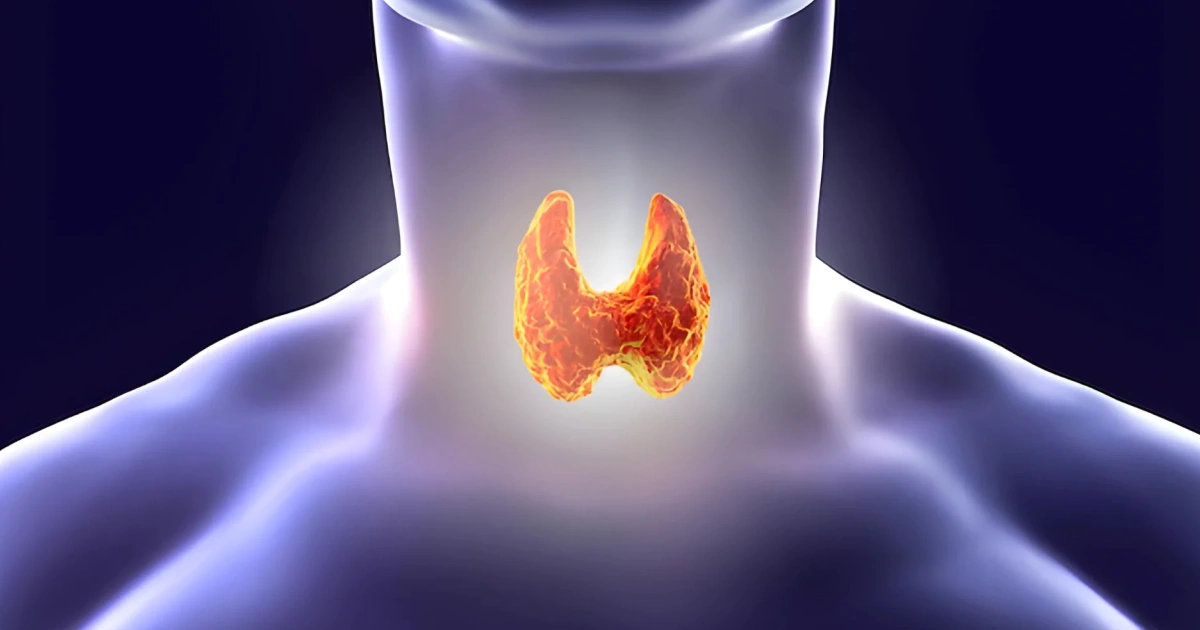Hashimoto’s disease is an autoimmune condition that affects the thyroid, and for many people, symptoms don’t stay constant. Instead, they can worsen suddenly during what’s known as a Hashimoto’s flare-up. These flare-ups can be confusing and frustrating, especially because symptoms often overlap with everyday stress, hormonal changes, or other health issues.
This blog helps you get clear on what a Hashimoto’s flare-up looks like, including common physical, mental, and emotional signs to watch for. It explains why flare-ups may happen, how they can affect daily life, and why recognizing early warning signals matters for long-term thyroid health.
Whether you’ve been recently diagnosed or have been managing Hashimoto’s for years, understanding flare-ups can empower you to have more informed conversations with your healthcare provider and take proactive steps in your care. The goal is not self-diagnosis, but awareness, clarity, and better support as you navigate living with Hashimoto’s.
What is Hashimoto’s Disease?
Hashimoto’s thyroiditis, also called Hashimoto’s disease, is an autoimmune condition. Thyroid gland damage occurs when it attacks the immune system by mistake. As a result, hypothyroidism can develop when the thyroid does not produce enough hormones to meet the body’s needs.
A condition in which the immune system attacks and destroys healthy body tissue by mistake is referred to as an autoimmune disorder.

What is Graves’ Disease?
Graves’ disease causes hyperthyroidism or an overactive thyroid gland. You produce more thyroid hormones than you need, so your body speeds up many of its functions.
Hashimoto’s and Graves’ diseases are both autoimmune disorders that affect your thyroid gland, which produces hormones that regulate your body’s basal metabolic rate.
What is a Hashimoto’s flare-up?
A Hashimoto’s flare-up is a temporary increase in symptoms experienced by people with Hashimoto’s disease. These flare-ups can be brought on by stress, illness, or other triggers and can last for days or weeks at a time. During a flare-up, people may experience fatigue, brain fog, joint pain, and other symptoms.
Hashimoto’s disease flare-ups can generate hypothyroid symptoms even if you are receiving treatment for it. If this occurs, it’s most likely because your thyroid replacement hormone is insufficient, typically levothyroxine (T4).
Symptoms of Hashimoto’s Flare Up
When you have a Hashimoto’s flare-up, your symptoms can feel much worse than usual. They often come on quickly and can be overwhelming. Here are the main signs to watch for:
Energy and Temperature Problems
You might feel:
- Extremely tired, even after sleeping
- Cold all the time, no matter how warm it is
- Like you need to sleep more but still feel exhausted
- Your hands and feet are always cold
Body Changes You Can See
Look out for:
- Sudden weight gain without eating more
- More hair falling out than normal
- Dry, rough skin
- Puffy face, especially around your eyes
- Severe constipation or stomach bloating
Aches and Pains
You may experience:
- Sore joints, especially when you wake up
- Weak muscles or muscle cramps
- Stiffness that makes it hard to move
- Taking much longer to feel better after exercise
Brain and Mood Issues
Common problems include:
- Trouble focusing or concentrating
- Forgetting things more often
- Feeling like your brain is “foggy”
- Having trouble finding the right words
- Feeling more irritable or moody
- Sadness or feeling hopeless
- Worry or anxiety
- Feeling overwhelmed by small things
Sleep Problems
You might notice:
- Can’t fall asleep even when you’re tired
- Waking up many times during the night
- Still feeling tired after sleeping all night
- Needing naps during the day
Heart and Breathing Changes
Some people feel:
- Their heart beating slower than normal
- Short of breath when doing light activities
- Their heart skipping beats or beating irregularly
- Tightness in their chest
Throat and Neck Issues
Watch for:
- Feeling like something is stuck in your throat
- Trouble swallowing food or drinks
- Your voice sounding different or hoarse
- Swelling you can see in your neck
Women’s Health Changes
Women may notice:
- Heavier periods or periods that come at odd times
- Worse menstrual cramps
- Less interest in intimacy
How Does It Difference from Normal Thyroid Symptoms?

Understanding the difference helps you know when you might be having a flare-up and when to get help. Here’s a complete comparison:
| What to Compare | Normal Thyroid Symptoms | Hashimoto’s Flare-Up Symptoms |
| How fast symptoms start | Slowly over weeks or months | Suddenly over just a few days |
| How consistent they are | Pretty much the same every day | Good days mixed with really bad days |
| How strong they feel | Mild to moderate, steady | Can be very intense and overwhelming |
| How long they last | Ongoing until you get treatment | Come and go in episodes (days to weeks) |
| How medicine helps | Gets better in a predictable way | May not help right away, needs adjustments |
| Fatigue level | Tired but you can still function | So exhausted you can’t do daily tasks |
| Brain fog | Some trouble thinking clearly | Can’t concentrate or focus at all |
| Mood changes | Mild sadness or worry | Severe depression, anxiety, or mood swings |
| Joint pain | Some stiffness, manageable | Very painful, hard to move around |
| Weight changes | Gradual weight gain over time | Sudden, noticeable weight gain |
| Hair loss | Slow thinning over months | Lots of hair falling out quickly |
| Sleep issues | Some trouble sleeping | Major sleep problems, very disruptive |
| Heart symptoms | Slightly slower heartbeat | Noticeable heart rate changes |
| Inflammation signs | Usually none | Joint swelling, feeling flu-like |
| Immune system | No major changes | Getting sick more often, swollen glands |
| Thyroid gland | Stays about the same size | May get bigger, tender, or painful |
| Throat problems | Rarely any issues | Tightness, trouble swallowing, voice changes |
| Sensitivity to triggers | Stable reactions to stress/food | Very sensitive, small triggers cause big problems |
| TSH blood levels | Stay fairly consistent | Jump up and down a lot |
| Thyroid hormone levels | Steady when taking medicine | Go up and down unpredictably |
| Antibody levels | High but don’t change much | Get much higher during flares |
| Inflammation markers | Usually normal | Often high (ESR, CRP tests) |
| Response to lifestyle changes | Slow, steady improvement | Can help quickly or make things worse fast |
| Need for stress management | Helpful but not critical | Absolutely necessary to prevent flares |
| Diet sensitivity | Consistent reactions | Very sensitive, foods can trigger flares |
| Exercise tolerance | Gradually gets better with treatment | May need to stop or reduce significantly |
| Recovery time | Improves steadily with medicine | May get better quickly with right treatment |
| How often symptoms change | Rarely change once stable | Can change from day to day |
| Trigger sensitivity | Takes a lot to make symptoms worse | Small stresses can cause big flares |
| Treatment approach needed | Consistent medicine and lifestyle | May need extra treatments and frequent adjustments |
| Doctor visit frequency | Regular checkups every few months | May need more frequent monitoring |
| Overall experience | Predictable and manageable | Unpredictable and often overwhelming |
Know more: Thyroid Disorders: Causes, Treatments, and Symptoms
What are the causes of Hashimoto’s flare-up?
Nutrient Deficiencies
- Iodine
- Selenium
- Zinc
- Vitamins B-12 and D
Medicines and Supplements
Thyroid medication can be interfered with by certain drugs and supplements.
- Calcium Carbonate
- Iron
- Multivitamins containing calcium and iron
- Antacids
- Estrogens – used in birth control pills or hormone replacement therapy
- Certain medications for lowering cholesterol, ulcer, seizure, and antibiotics
Stress
- Emotional Stress – pertains to work, relationships, and health.
- Physical Stress – going through an illness, injury, or surgery.
- Pregnancy, menopause, and other life changes.

The triggers of Hashimoto’s flare-up
-
Diet : A healthy diet can stimulate your hormones, brain, and gut, reversing immune dysfunction and inflammation.
-
Emotional & Physical Stress : The impact of stress on your body is far-reaching, affecting everything from your hormone production to your immune system.
-
Viral Infections : One environmental factor triggering an autoimmune outbreak is viral infections (like rubella, mumps, or Epstein-Barr virus), and a virus causes inflammation as a defense mechanism. Conditions of any kind can put a strain on your body, making it susceptible to disruptions.
-
Lack of Sleep & Lack of Exercise : Thyroid health can improve by getting enough sleep. If you struggle to fall asleep, stay asleep, or get low-quality sleep, your immune system will have a difficult time building up its forces.
-
Bacterial Infections (Acute or Recurrent) : Bacterial infections can also stress the immune system, leading to Hashimoto’s exacerbations.
-
Parasites : Parasites can also trigger outbursts. There have been reports that some cases of Hashimoto’s are associated with blastocystis hominis infections.
-
Exposure to Endocrine Disrupting Chemicals : Chemicals that disrupt hormones are classified as EDCs. EDC chemicals like these either block or mimic native hormones in the body. Moreover, they make thyroid lab tests appear better than they are, thus interfering with thyroid diagnosis. These chemicals are found in plastics, receipts, drinking water, clothing, lotions, creams, etc.
-
Leaky Gut : A leaky gut means that your body’s protective barrier (intestinal lining) is not as effective, and toxins may enter your bloodstream unintentionally. You may experience inflammation in your gut, or your immune system may react to the toxins, two factors that can cause a flare-up.
How are Hashimoto’s flare ups treated?
- Changing your medication or stopping it may be recommended by your healthcare provider.
- Researchers suggest that bioidentical thyroid replacement may be more effective.
- If you have nutrient deficiencies, your thyroid function will improve by taking supplements or changing your diet.
- Mindfulness meditation may improve immune system function for stress-related thyroid flare-ups.

Lifestyle Changes for Hashimoto’s
Diets
- gluten-free diet
- sugar-free diet
- Paleo diet
- grain-free diet
- dairy-free diet
- an autoimmune modified paleo diet
- low glycemic index diet
Supplements
- Vitamin D
- Selenium
- Zinc
- Curcumin
- B Complex vitamins
- Magnesium
- Iron
- Thyroid Synergy or Thyroid Support Complex
When to see an expert for a Hashimoto’s flare up?
If in case of unexplained weight gain, fatigue, hair loss, and constipation, consult your functional medicine practitioner to find out if you are experiencing Hashimoto’s thyroiditis flare-ups.
People with Hashimoto’s disease must be aware of the potential for a flare-up while taking the necessary steps for prevention. If you are experiencing any Hashimoto symptoms, it is essential to seek medical help immediately to prevent or minimize the outbreak’s severity while keeping the thyroid hormone levels in check.
FAQ’s
1. What Helps a Hashimoto’s Flare-Up?
To manage a flare-up, focus on stress reduction, a healthy diet, adequate sleep, and thyroid medication adjustments. Avoid food triggers like gluten and dairy.
2. How Long Does a Hashimoto’s Flare-Up Last?
Flare-ups typically last from a few days to a few weeks, depending on severity and how well symptoms are managed.
3. What is the Ideal TSH Level for Hashimoto’s?
For Hashimoto’s, the ideal TSH level is usually 0.4 to 4.0 mU/L, but it’s best to consult with your doctor for personalized targets.
4. What Are the Worst Symptoms of Hashimoto’s?
The worst symptoms can include fatigue, weight gain, cold intolerance, brain fog, joint pain, and depression.
5. How Can I Quickly Reduce Hashimoto’s Inflammation?
To reduce inflammation, try anti-inflammatory foods, stress management, and getting enough sleep. Medications may also be adjusted by your doctor.

